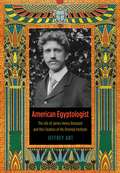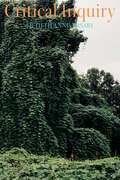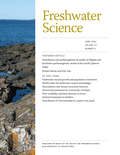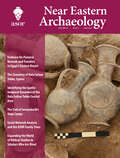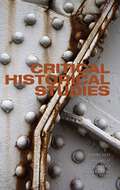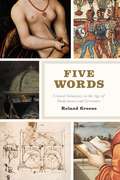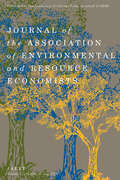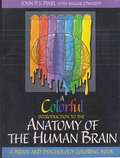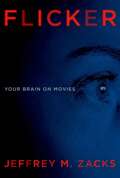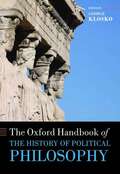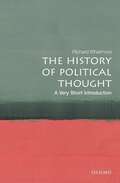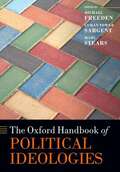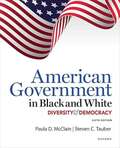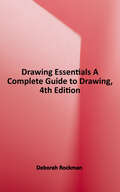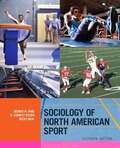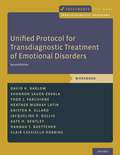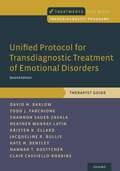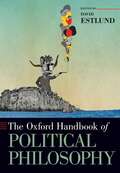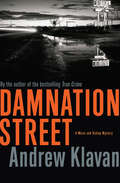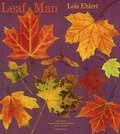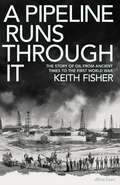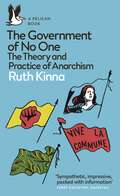- Table View
- List View
American Egyptologist: The Life of James Henry Breasted and the Creation of His Oriental Institute
by Jeffrey AbtJames Henry Breasted (1865–1935) had a career that epitomizes our popular image of the archaeologist. Daring, handsome, and charismatic, he traveled on expeditions to remote and politically unstable corners of the Middle East, helped identify the tomb of King Tut, and was on the cover of Time magazine. But Breasted was more than an Indiana Jones—he was an accomplished scholar, academic entrepreneur, and talented author who brought ancient history to life not just for students but for such notables as Teddy Roosevelt and Sigmund Freud.In American Egyptologist, Jeffrey Abt weaves together the disparate strands of Breasted’s life, from his small-town origins following the Civil War to his evolution into the father of American Egyptology and the founder of the Oriental Institute in the early years of the University of Chicago. Abt explores the scholarly, philanthropic, diplomatic, and religious contexts of his ideas and projects, providing insight into the origins of America’s most prominent center for Near Eastern archaeology. An illuminating portrait of the nearly forgotten man who demystified ancient Egypt for the general public, American Egyptologist restores James Henry Breasted to the world and puts forward a brilliant case for his place as one of the most important scholars of modern times.
Critical Inquiry, volume 50 number 4 (Summer 2024)
by Critical InquiryThis is volume 50 issue 4 of Critical Inquiry. Critical Inquiry is a peer-reviewed interdisciplinary journal devoted to the best critical thought in the arts and humanities. Combining a commitment to rigorous scholarship with a vital concern for dialogue and debate, the journal presents articles by eminent and emerging scholars, critics, and artists on a wide variety of issues in contemporary criticism and culture. Associated with no single school of thought, tied to no single discipline, Critical Inquiry is dedicated to providing a forum for cutting-edge thought while reconsidering traditional concepts and practices.
Freshwater Science, volume 43 number 2 (June 2024)
by Freshwater ScienceThis is volume 43 issue 2 of Freshwater Science. Freshwater Science (FWS) publishes articles that advance understanding and environmental stewardship of all types of inland aquatic ecosystems (lakes, rivers, streams, reservoirs, subterranean, and estuaries) and ecosystems at the interface between aquatic and terrestrial habitats (wetlands, riparian areas, and floodplains). The journal regularly features papers on a wide range of topics, including physical, chemical, and biological properties of lentic and lotic habitats; ecosystem processes; structure and dynamics of populations, communities, and ecosystems; ecology, systematics, and genetics of freshwater organisms, from bacteria to vertebrates; linkages between freshwater and other ecosystems and between freshwater ecology and other aquatic sciences; bioassessment, conservation, and restoration; environmental management; and new or novel methods for basic or applied research.
Near Eastern Archaeology, volume 87 number 2 (June 2024)
by Near Eastern ArchaeologyThis is volume 87 issue 2 of Near Eastern Archaeology. Archaeological discoveries continually enrich our understanding of the people, culture, history, and literature of the Middle East. The heritage of its peoples—from urban civilization to the Bible—both inspires and fascinates. Near Eastern Archaeology brings to life the ancient world from Mesopotamia to the Mediterranean with vibrant images and authoritative analyses.
Critical Historical Studies, volume 11 number 1 (Spring 2024)
by Critical Historical StudiesThis is volume 11 issue 1 of Critical Historical Studies. Critical Historical Studies is an interdisciplinary journal devoted to historical reflections on politics, culture, economy, and social life. CHS features research on the implications of socio-economic transformations for cultural, political, and social change. In the broad tradition of Critical Theory, CHS will explore the complex connections between cultural form and socio-economic context and promote a reflexive awareness of the researcher’s own position in the history of global capitalist society. The journal aims to foster interdisciplinary exchange among scholars across the entire range of the social sciences and humanities, and publishes work on all historical eras and regions of the world.
Five Words: Critical Semantics in the Age of Shakespeare and Cervantes
by Roland GreeneBlood. Invention. Language. Resistance. World. Five ordinary words that do a great deal of conceptual work in everyday life and literature. In this original experiment in critical semantics, Roland Greene considers how these words changed over the course of the sixteenth century and what their changes indicate about broader forces in science, politics, and other disciplines. Rather than analyzing works, careers, or histories, Greene discusses a broad swath of Renaissance and transatlantic literature—including Shakespeare, Cervantes, Camões, and Milton—in terms of the development of these five words. Aiming to shift the conversation around Renaissance literature from current approaches to riskier enterprises, Greene also proposes new methods that take advantage of digital resources like full-text databases, but still depend on the interpreter to fashion ideas out of ordinary language. Five Words is an innovative and accessible book that points the field of literary studies in an exciting new direction.
Journal of the Association of Environmental and Resource Economists, volume 11 number 4 (July 2024)
by Journal of the Association of Environmental and Resource EconomistsThis is volume 11 issue 4 of Journal of the Association of Environmental and Resource Economists. As an official research journal of the Association of Environmental and Resource Economists, JAERE publishes papers that are devoted to environmental and natural resource issues. The journal's principal mission is to provide a forum for the scholarly exchange of ideas in the intersection of human behavior and the natural environment. Focusing on original, full-length research papers that offer substantial new insights for scholars of environmental and resource economics, JAERE presents a range of articles that are relevant for public policy, using approaches that are theoretical, empirical, or both.
A Colorful Introduction to the Anatomy of the Human Brain: A Brain and Psychology Coloring Book
by John P.J. Pinel Maggie E. EdwardsThousands of people inquire about and buy a competitor to this book each year. Unique layout compared to the competition! Text is on the left page with illustration on facing page. A cover flap can cover the illustration's labels for easy self-testing. Up-to-date information covers the latest findings. Available now! Acknowledging the difficulty many readers have when first attempting to learn about the brain's psychological functions, the authors of A Colorful Introduction to the Human Brain have created a book that makes the fascinating world of brain psychology research accessible to readers with little or no background in neuroscience. Readers learn the material in several steps. First they read through the introduction and definitions on the left page; then they color the illustration on the facing page; and finally they use the special cover flap to conceal the illustration labels while checking their knowledge, until they feel they have completely learned the material. Review exercises at the end of each chapter provide an opportunity for self-assessment, with answers provided at the end of the book. <P><P> John Pinel, a professor of biopsychology at the University of British Columbia, is an award-winning teacher and the author of over 200 scientific articles. However, he is best known for his reader-oriented writing. His clear concise introductions to behavioral neuroscience have inspired, enthralled, and amused a generation of students and lay people.
Flicker: Your Brain On Movies
by Jeffrey ZacksHow is it that a patch of flickering light on a wall can produce experiences that engage our imaginations and can feel totally real? From the vertigo of a skydive to the emotional charge of an unexpected victory or defeat, movies give us some of our most vivid experiences and most lasting memories. They reshape our emotions and worldviews--but why? In Flicker, Jeff Zacks delves into the history of cinema and the latest research to explain what happens between your ears when you sit down in the theatre and the lights go out. Some of the questions Flicker answers: Why do we flinch when Rocky takes a punch in Sylvester Stallone's movies, duck when the jet careens towards the tower in Airplane, and tap our toes to the dance numbers in Chicago or Moulin Rouge? Why do so many of us cry at the movies? What's the difference between remembering what happened in a movie and what happened in real life--and can we always tell the difference? To answer these questions and more, Flicker gives us an engaging, fast-paced look at what happens in your head when you watch a movie.
The Oxford Handbook Of The History Of Political Philosophy
by George KloskoThe Oxford Handbook of the History of Political Philosophy presents fifty original essays, each specially written by a leading figure in the field, covering the entire subject of the history of political philosophy. They provide not only surveys of the state of research but substantial pieces that engage with, and move forward, current debates. Part I addresses questions of method. Contributors discuss the contextual method, classically articulated by Quentin Skinner, along with important alternative methods associated with Leo Strauss and his followers, and contemporary post-modernism. This section also examines the value of the history of political philosophy and the history of the discipline itself. Part II, Chronological Periods, works through the entire history of Western political philosophy. While most contributions address recognizable chronological periods, others are devoted to more specialized topics, including the influence of Roman Law, medieval Arabic political philosophy, Socialism, and Marxism. Aspects of the history of political philosophy that transcend specific periods are the subject of Part III. Essays on topics such as democracy, the state, and imperialism trace theoretical developments over time. The histories of major non-Western traditions-Muslim, Confucian, and Hindu-are discussed in the final Part, with special reference to their relationships to Western political thought.
The History of Political Thought: Jealousy Of Trade And The History Of Political Thought (Very Short Introductions Ser.)
by Richard WhatmoreThe Oxford Handbook of Political Ideologies (Oxford Handbooks Ser.)
by Michael Freeden Marc Stears Lyman Tower SargentAmerican Government in Black and White: Diversity and Democracy
by Paula McClain Steven TauberAmerican Government in Black and White: Diversity and Democracy, Sixth Edition, covers the standard topics found in an Introduction to American Government text while also speaking to today's students who want to examine how racial inequality has shaped--and will continue to shape--who we are and what we believe. Authors Paula D. McClain and Steven C. Tauber address issues of inequality in American government, including the U.S. Constitution, key political institutions, the making of public policy while showing how to measure and evaluate the importance of equality in America, from its founding up to today.
Comparative Politics
by Daniele CaramaniWith unparalleled empirical material, this is the most comprehensive introduction to comparative politics written by the leading experts in the field who bring together a diverse and informed international perspective on comparative politics. Six new authors join the team for the sixth edition, bringing fresh ideas and insights to the comparative analysis the book provides. The new edition has been brought fully up to date with coverage of the Covid-19 pandemic, Russia's invasion of Ukraine, and challenges to the global international order. A new chapter on the Nation-State and multicultural citizenship focuses on identity, community, ethnicity, migration, and regions. In addition to this, a new chapter 11, 'Direct Democracy', provides cutting-edge analysis of referendums, citizen assemblies, and other forms of democratic innovations. Additional analysis of gender equality, poverty, and climate change is provided from a global perspective in the new chapter 22, which examines the impact of public policies. And finally, a new chapter 25, 'Promoting and Protecting Democracy', draws on the latest developments, such as global shifts towards authoritarian regimes and autocracy, and international relations perspectives, to present a clear overview of democracy promotion. An unrivalled amount of empirical material in the text illustrates the key similarities and differences across political systems. The wealth of empirical data also encourages students to go beyond the 'what' of comparison to the 'how'. Combining cutting edge treatment of theories and truly global geographical coverage, this exciting textbook is essential reading for all comparative politics students. The sixth edition includes a wealth of embedded digital resources, which are accessible through the enhanced e-book. These include: - Multiple-choice questions for every section, designed to reinforce students' understanding of key points through frequent and cumulative revision, and to assist with independent self-study - Interactive graphs with live-updating data, which allow readers to manipulate and customise their own charts, to help reinforce understanding of empirical data in the context of each chapter - A library of web links to relevant databases, blogs, debates, and videos, to help explore research interests and take learning further - Answers to end of chapter questions, which contain useful hints and tips to help tackle the knowledge-based, critical thinking, and applied questions - Videos of news reports, speeches, analysis, and key events to help bring theories and concepts to life - A bank of comparative tables and country profiles, which illustrate ideas and concepts, but can also be used in students' own research and analysis, giving readers a real sense of how comparative politics works in practice. - An interactive flashcard glossary to test students' knowledge and understanding of each chapter's key terms Teaching resources for adopting lecturers include: - Seminar activities that lecturers can use to engage their students, based on the content of each chapter - A bank of questions for lecturers to use to test students' understanding of key concepts covered in the chapters
Drawing Essentials: A Complete Guide to Drawing
by Deborah RockmanWith unparalleled clarity, Drawing Essentials: A Complete Guide to Drawing, Fourth Edition, explains in depth the essentials of depicting form and space on a two-dimensional surface, focusing on the cultivation of observational skills, increased sensitivity, critical thinking, technical refinement, and knowledge of materials. This richly illustrated text is appropriate for use in all levels of drawing classes, from introductory to advanced levels, as well as for figure and life drawing classes.
The Alt-Right What Everyone Needs To Know: What Everyone Needs To Know® (What Everyone Needs To Know Ser.)
by George HawleySociology Of North American Sport
by D. Stanley Eitzen George H. Sage Becky BealNow in its eleventh edition, Sociology of North American Sport offers a compact yet comprehensive and integrated perspective on sport in North American society. Bringing a unique viewpoint to the subject, George H. Sage, D. Stanley Eitzen, and Becky Beal analyze and, in turn, demythologize sport. This method promotes an understanding of how a sociological perspective differs from commonsense perceptions about sport and society, helping students to understand sport in a new way.
Unified Protocol for Transdiagnostic Treatment of Emotional Disorders: Workbook (Treatments That Work)
by David H. BarlowLeading therapists and researchers have come to understand that many psychological disorders share common features and respond to common therapeutic treatments. This deepened understanding of the nature of psychological disorders, their causes, and their symptoms has led to the development of new, comprehensive treatment programs that are effective for whole classes of disorders. Unified Protocol for Transdiagnostic Treatment of Emotional Disorders is one such program. <P><P>Designed for individuals suffering from emotional disorders, including panic disorder, social anxiety disorder, generalized anxiety disorder, posttraumatic stress disorder, obsessive compulsive disorder, and depression, this program focuses on helping you to better understand your emotions and identify what you're doing in your responses to them that may be making things worse. Throughout the course of treatment you will learn different strategies and techniques for managing your emotional experiences and the symptoms of your disorder. You will learn how to monitor your feelings, thoughts, and behaviors; confront uncomfortable emotions; and learn more effective ways of coping with your experiences. By proactively practicing the skills presented in this book-and completing the exercises, homework assignments and self-assessment quizzes provided in each chapter, you will address your problems in a comprehensive and effective way so you can regulate your emotional experiences and return to living a happy and functional life.
Unified Protocol for Transdiagnostic Treatment of Emotional Disorders: Therapist Guide (Treatments That Work)
by David H. Barlow Todd J. Farchione Christopher P. FairholmeContemporary research on major emotional disorders emphasizes their commonalities rather than their differences. This research continues to lend support for a unified transdiagnostic approach to treatment of these disorders that considers their commonalities and is applicable to a range of emotional problems. <P><P>Unified Protocol for Transdiagnostic Treatment of Emotional Disorders provides an alternative to disorder-specific treatments of various emotional disorders, designed to be applicable to the wide range of anxiety and other disorders with strong emotional components. The Therapist Guide and accompanying client Workbook present an eight-module therapy program that puts substantial emphasis on emotion-focused approaches, helping clients confront and experience challenging emotions while teaching them how to regulate those emotions. Expanded considerably in this second edition, the volume provides guidance on using the Unified Protocol (UP) to address problems not only with anxiety, but also with depression, eating disorders, non-suicidal self-injury, substance use, and anger. Treatment procedures have been further elucidated and more guidance is provided to practitioners on how to present key treatment concepts. Chapters brand new to this updated edition introduce functional assessment and describe how to provide the UP in a group format, while patient materials have been revised, streamlined, and made more user-friendly.
The Oxford Handbook Of Political Philosophy
by David EstlundEven though political philosophy has a long tradition, it is much more than the study of old and great treatises. Contemporary philosophers continue to press new arguments on old and timeless questions, but also to propose departures and innovations. The field changes over time, and new work inevitably responds both to events in the world and to the directions of thought itself. This volume includes 22 new pieces by leaders in the field on both perennial and emerging topics of keen interest to contemporary political philosophers. In addition to longstanding issues such as Authority, Equality, and Freedom, and Democracy, there are articles on less classical topics such as Race, Historical Injustice, Deliberation, Money and Politics, Global Justice, and Ideal and Non-Ideal Theory. All of the pieces combine clarity and accessibility with a top scholar's critical and original point of view. The introductory essay briefly situates this snapshot of the state of the art in a broader view of developments in political philosophy in the last 40 years, and looks forward to future developments. Students and scholars alike will find the pieces to be valuable not only surveys but as provocations to think further about the questions, puzzles, and practical problems that animate recent work in political philosophy. The issues will be of interest to many working in philosophy, political science, law, economics, and more.
Damnation Street (The Weiss and Bishop Mysteries)
by Andrew Klavan&“Great characters, inventive plotting, darkness, light, horror, and humor . . . a relentless tale of suspense&” from an Edgar Award–winning author (Booklist, starred review). They are two sworn enemies with a single obsession: a woman on the run from them both. Scott Weiss is a private detective. John Foy is a professional killer. The woman is Julie Wyant, a hooker with the face of an angel. Julie spent one night with Foy—a night of psychopathic cruelty that Foy called love. Desperate to get away from him, she vanished without a trace. And Foy wants her back. There&’s only one man who can find her: Weiss, the best locate operative in the business. She&’s begged him not to look for her, fearing he&’ll bring the killer in his wake. But Weiss can&’t stay away. Now, from a town called Paradise, through a wilderness that feels like hell, Weiss searches for Julie—and the killer follows, waiting for his chance. They are two expert hunters matching move for move—until it ends on Damnation Street.
Leaf Man
by Lois EhlertRide the wind and drift east with Leaf Man in this autumnal classic by Caldecott Honor-winning author-illustrator Lois Ehlert, perfect for young readers returning to school in the fall. Fall has come, the wind is gusting, and Leaf Man is on the move. Is he drifting east, over the marsh and ducks and geese Or is he heading west, above the orchards, prairie meadows, and spotted cows? No one's quite sure, but this much is certain: A Leaf Man's got to go where the wind blows. Ehlert crafts each illustration out of actual fall leaves on every spread to reveal gorgeous landscapes. This playful and whimsical book celebrates the natural world and the rich imaginative life of children.
A Pipeline Runs Through It: The Story of Oil from Ancient Times to the First World War
by Keith Fisher'Fascinating revelations' Max Hastings, Sunday Times'Wonderfully detailed and colourful' Steven Poole, Daily Telegraph'The book I have long been waiting for... Essential reading' Michael KlarePetroleum has always been used by humans: as an adhesive by Neanderthals, as a waterproofing agent in Noah's Ark and as a weapon during the Crusades. Its eventual extraction from the earth in vast quantities transformed light, heat and power. A Pipeline Runs Through It is a fresh, comprehensive in-depth look at the social, economic, political and geopolitical forces involved in our transition to the modern oil age. It tells an extraordinary origin story, from the pre-industrial history of petroleum through to large-scale production in the mid-nineteenth century and the development of a dominant, fully-fledged oil industry by the early twentieth century.This was always a story of imperialist violence, political disenfranchisement, economic exploitation and environmental destruction. The near total eradication of the Native Americans of New York, Pennsylvania and Ohio has barely been mentioned as a precondition for the emergence of the first industrialised oil region in the United States. Britain's invasion of Upper Burma in 1885 was perhaps the first war fought, at least in part, for access to oil; the growth of Royal Dutch-Shell involved the genocidal subjugation of people of the Dutch East Indies and the exploitation of oil in the Middle East arose seamlessly out of Britain's prior political and military interventions in the region.Finally, in an entirely new analysis, the book shows how the British navy's increasingly desperate dependence on vulnerable foreign sources of oil may have been a catalytic ingredient in the outbreak of the First World War. The rise of oil has shaped the modern world, and this is the book to understand it.
The Government of No One: The Theory and Practice of Anarchism (Pelican Books)
by Ruth Kinna'The standard book on anarchism for the twenty-first century. Written with brio, quiet insight and clarity' Carl LevyA magisterial study of the history and theory of one of the most controversial political movementsAnarchism routinely gets a bad press. It's usually seen as meaning chaos and disorder -- or even nothing at all. And yet, from Occupy Wall Street to Pussy Riot, Noam Chomsky to David Graeber, this philosophical and political movement is as relevant as ever. Contrary to popular perception, different strands of anarchism -- from individualism to collectivism -- do follow certain structures and a shared sense of purpose: a belief in freedom and working towards collective good without the interference of the state. In this masterful, sympathetic account, political theorist Ruth Kinna traces the tumultuous history of anarchism, starting with thinkers and activists such as Peter Kropotkin and Emma Goldman and through key events like the Paris Commune and the Haymarket affair. Skilfully introducing us to the nuanced theories of anarchist groups from Russia to Japan to the United States, The Government of No One reveals what makes a supposedly chaotic movement particularly adaptable and effective over centuries -- and what we can learn from it.
